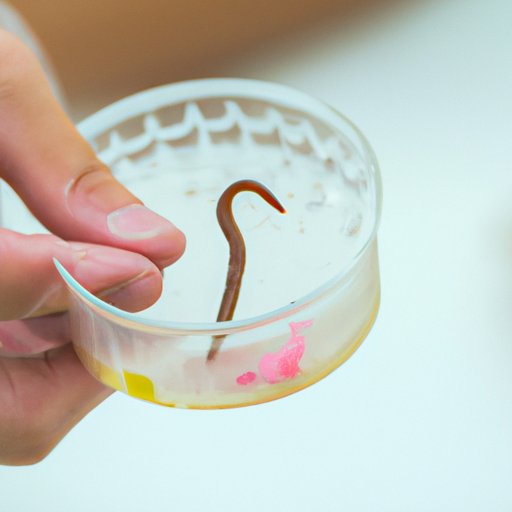Introduction
Worms are parasitic creatures that can cause serious health problems if they get into the human body. While most people associate worms with animals like dogs and cats, there is a possibility that these parasites can travel through our bodies as well. This article will explore the chances of worms entering our systems and the associated dangers, as well as look at how we can prevent infection and treat worms if needed.
Exploring the Possibility of Worms Traveling Through the Human Body
There are several types of worms that can travel through the body, including tapeworms, roundworms, pinworms, and hookworms. These worms can enter the body in different ways, such as through contaminated food or water, contact with infected animals, or through contact with soil or sand. In some cases, worms may even be passed from one person to another through close contact.

Investigating How Worms Could Infiltrate Our Bodies
Worms can spread from one person to another through contact with contaminated objects, such as clothing, toys, or bedding. They can also be transmitted through sexual contact or by eating food that has been contaminated with eggs or larvae. The eggs or larvae can then develop into adult worms inside the body.
Uncovering the Dangers of Worms Entering Our Systems
Having worms in the body can pose a number of health risks. They can cause abdominal pain, nausea, vomiting, and diarrhea. In severe cases, worms can even lead to anemia due to blood loss. Long-term worm infections can also cause damage to internal organs, as well as interfere with normal growth and development in children.

Examining the Symptoms of a Worm Infestation
The symptoms of a worm infestation vary depending on the type of worm. Common signs and symptoms include itchy skin, nausea, weight loss, abdominal pain, and changes in bowel habits. If you experience any of these symptoms, it is important to seek medical attention as soon as possible.
Analyzing the Causes of Worm Infections in Humans
There are several risk factors for worm infections in humans, including poor hygiene, contact with contaminated soil or water, and contact with infected animals or people. Environmental sources of worm contamination include sewage, animal waste, and contaminated food or water.

Investigating the Treatment Options for Worms in the Body
Treatment for worms in the body typically involves taking medications to kill the parasites and reduce their numbers. The most common medications used to treat worms are antihelminthic drugs, which can help to rid the body of worms within a few days. Alternative therapies, such as herbal remedies, may also be used to treat worms.

Understanding How to Prevent Worms from Entering the Body
The best way to prevent worm infections is to practice good hygiene. This includes washing your hands regularly, avoiding contact with contaminated soil or water, and wearing shoes or protective clothing when outdoors. Vaccines are also available to protect against certain types of worms.
Conclusion
In conclusion, worms can travel through the human body and pose a number of health risks. It is important to take preventive measures to reduce the risk of infection, such as practicing good hygiene and avoiding contact with contaminated environments. If you suspect you have a worm infestation, it is important to seek medical attention as soon as possible. With the right treatment, it is possible to rid the body of these parasites and reduce the risk of complications.
(Note: Is this article not meeting your expectations? Do you have knowledge or insights to share? Unlock new opportunities and expand your reach by joining our authors team. Click Registration to join us and share your expertise with our readers.)
